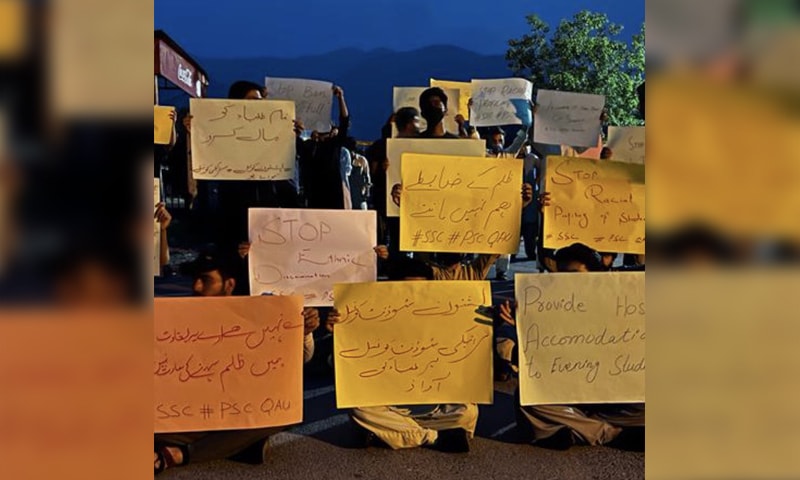ISLAMABAD: The deadlock between Quaid-i-Azam University (QAU) administration and protesting students continued as university is closed since Monday due to strike.
After Eid holidays, the university was supposed to reopen on Monday, but due to strike by students mainly belonging to Pakhtoon Students Council and Saraiki Students Council, the university has been closed.
Additional Deputy Commissioner of Islamabad Capital Territory Administration and Superintended of Police also visited the protesting students’ camp on Thursday and held talks to convince them to call off strike, but they refused demanding university should first restore rusticated students.
They are also running a campaign on social media stating that whenever students talk for their rights, the university administration started taking action against them.
Before starting strike on Monday, the Pakhtoon Council tweeted: “There will be a peaceful protest from today which will continue until the legal demands of the students are accepted and the QAU administration is made accountable for racial profiling of our community.”
The protesting students also alleged that numbers of Pakhtoon students have been rusticated from the QAU, which is discriminatory.
QAU officials Dawn spoke to said that during the last few years over 30 students had been rusticated and majority of them were Pakhoons, because of their alleged involvement in strikes.
Registrar QAU Dr Raja Qaiser Ahmed on Wednesday wrote two letters to Deputy Commissioners Islamabad, seeking help to resolve the strike issue. In one of the letter, the registrar also stated: “significant number of outsiders who are not students of QAU and not associated with the university in any capacity are also part of the strike. The presence of outsiders is a looming threat to the law and order and might lead to some unwarranted situation,” read the letter.
In another letter, the QAU registrar informed deputy commissioner that the precarious situation persist consequently making university dysfunctional.
“The impending crisis at QAU is leading to irreparable academic loss and also may trigger some untoward unforeseen eventuality. Following the letters of Registrar, ADCG and SP visited the QAU on Thursday and held talks with protesting students and university administration.
Meanwhile, an official of QAU said on Friday that the university administration and district administration made fresh attempts to convince the students to call off their strike but to no avail.
He said as per rules, university can’t reverse its decision of expelling students with simple notification, as being demanded by protesting students, and if need arises, then cases of students could be placed before the proper forum to look into it, he said.
Published in Dawn, May 13th, 2022













































Dear visitor, the comments section is undergoing an overhaul and will return soon.